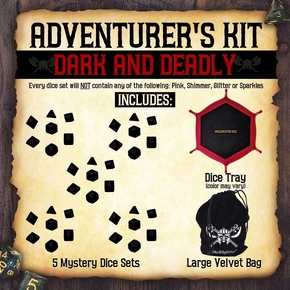
Player's Guide to Adventuring in Spacefaring Campaigns (SpellJammer, Star Wars, StarFinder)
Table of Contents:
Beam Me Up!
Adventuring in Spacefaring Campaigns
Blast off, beam up, and rocket towards the unknown because your next campaign is taking on a cosmic scale. It’s a bit more than just a setting shift though if you’re used to traditional dungeons and/or dragons. By following just a few tips you can start your campaign with a small step forward instead of a giant leap back.

What Galaxy are We In?
There are countless homebrew systems for every flavor of space adventure, from gritty realistic sci-fi to lighthearted ray guns and Martians. Each system will have their own pros and cons to think about, but these 4 are some of the most likely suspects:
Starfinder. Does your group play Pathfinder? Then more than likely when space adventuring comes up it’s Starfinder you’ll turn to as it’s just Pathfinder in space. Practically all the pros and cons of Pathfinder are still present in Starfinder, so if you’re happy with Pathfinder you’ll have no problem making the transition. One major difference that takes a little getting used to is the new resolve and stamina system, but once you adjust, I think you’ll find it intuitive. If you’re not familiar with Pathfinder though, Starfinder is a rather dense and foreboding ruleset, prepare yourself for a long read before you get started.
Star Wars: Edge of Empire. Whether your GM brings this system because of its streamlined rules or just loves Star Wars, you’re in for a good adventure. You will have to adjust quite a bit of your preconceptions though if you’re used to a typical d20 system. Star Wars: Edge of Empire has its own weird set of dice, custom dice with their own symbols and without numbers. I was personally amazed by how intuitive and well thought-out the system worked with the dice; it feels very different from other systems without just being a gimmick. If you don’t want to find these weird dice, there’s a few free custom dice roller apps available, as well as a “conversion” system available so you can use a normal polyhedral set.
Spelljammer. This one’s more of a long shot, but it’s a classic and if your GM is a veteran player you might get to enjoy this fantastic setting. Spelljammer is an old beloved D&D setting that doesn’t have an official 5e version yet. Think solar sails on pirate ships in space, magical fantasy elements zipping between the planets on solar tides. It’s a pinch of steampunk, a dash of Flash Gordon mixed in with a ton of classical D&D goodness. Honestly, I’m really gushing about the setting more than anything else since there’s only a few homebrews for more modern systems in the setting (or there’s always the original). Still though, it’s one of the best ways to adventure among the stars.

Space Opera or Hard Sci-Fi?
Sci-fi settings are just as varied as traditional fantasy settings and once you’ve established the system you’re playing; you’ll want to figure out what your GM is going for. Should you prepare for harrowing spacewalks for emergency repairs? Or are you more likely to fight space wizards and rescue venutian princesses? Match your character thematically to the world your GM has in mind, it’ll save you quite a bit of headaches down the line.
Space Will Kill You
In space, nobody can hear you slowly run out of oxygen and freeze to death. The danger correlates to how fantastical or realistic your system is, but space is pretty much the most dangerous place you could possibly be besides maybe the heart of a volcano or something. Even more so than seafaring adventures, even more than planar adventures, if something goes wrong in space it goes really wrong.
Before your campaign starts, sit down with the system or your GM and figure out just how realistic space is going to be. The GM can do a whole lot of hand waving about shields or magical protection from the vacuum, but if they don’t, make sure you’re prepared. Have some back-up plans for survival.
Don’t Be the Spaceship Person
The crack pilot, the grease monkey that knows every bolt of your vessel, the ace ship gunner that never misses their shot, they all have a fundamental problem. You’ll probably have your share of starship battles, but what the heck do you do once you’ve landed? GM’s will normally split their adventures between some starship fights and missions touched down on planets, asteroids, and derelict space hulks. It may be tempting to completely design your character around starships, but trust me, it goes badly.
This will be better or worse advice depending on your system, but don’t devote your character to an element of the campaign that may not be there all the time. In one particular space-faring adventure (GURPS) we had one player who absolutely devoted everything to the ship, he was the pilot and the mechanic, that ship lived or died with him. Sadly though, 70% of the campaign took place on the planets they landed on. For 70% of the adventure, he basically got to do nothing but sit on the sidelines while the adventure unfolded.
I’m not saying you can’t be a pilot, or a mechanic, or a gunner, but I am saying you need to prepare for the time you don’t spend in your ship. Diversify a bit, maybe put a bit of demolitions background in with that grease monkey. Or maybe give that pilot a history of high-class espionage. Whatever it is, have a plan for what your character is like after the ship lands.
Have a Downtime Plan
I feel like I give this advice a lot, but it’s genuinely good advice in any campaign where you’re likely going to be covering long distances. Depending on your system you might be pushing a button and instantly arriving at the next planet, or you might have a month-long journey across the stars. If your combat specialist commando doesn’t have any idea how to spend a month, he’s just going to be bored. Give your character something they do in the off time, it can be something as simple as a hobby, or it can even be something mechanically useful like magic or explosives crafting. Anything beyond “nothing” is at least an improvement. Long star voyages can be a perfect opportunity to make something useful, or to really dig into that roleplay with how your character spends their journey.
Learn the Tech
In most fantasy settings, there may be magical items or unique aspects of the setting that take getting used to, but you generally know what does what. You know what a sword does, you know what a goblin is, nobody has to stop and look up what exactly a “dwarf” is. To a certain extent this is also true in a spacefaring adventure, you know what a laser rifle is and you know what a spaceship is. But do you know what a T-500 Auto-Field Emitter does? Is it a good thing? Does it explode?
Most fantasy settings get to gloss over this kind of thing by just stamping “magic” on anything as an explanation. Sci-Fi settings tend to give their items long technical names and their intended purpose isn’t always clear. If in the fantasy setting the orc warlord brandishes a flaming sword, you instantly know what’s up. But if a droid pulls out a different model of gun, ehh? It’s meaningless without the context and understanding of the weapon. This gets especially important in tactical situations where you need to know the target priority and a bit of threat assessment goes a long way. I highly recommend you take at least a cursory glance through the technological terms and items within a new Sci-Fi system, get to know them before you get onto a battlefield where it matters.
Speak the Lingo
You know how a dwarf talks, you know how an elf talks, but how does a Martian talk? Every Sci-Fi setting worth its salt has a ton of slang to pick up. Fun made-up insults, slick abbreviations and mega-corporation accents can really make a game feel not only authentic but also very different from your normal fantasy TTRPGS. I’ve played in a few Sci-Fi adventures, and on several occasions players who were bereft of their normal fantasy tropes just adopted mundane modern voices and inflections. Have fun with it! If your setting doesn’t spell any of this out, make something up! Even just a couple little things can really sell it, try making up some of the following for your character to say:
- Slang meaning something good (positive expletive).
- Slang meaning something bad (negative expletive).
- Slang meaning a small spaceship.
- Slang meaning someone from another world.
- A short meaningful phrase common among your kind.
- A short phrase that indicates everything is going well.
- A short phrase that means that we’re all going to die.
You don’t need it all at once, and don’t get too dense or esoteric with it. I think you’ll find though that a bit of authentic lingo will really bring the setting to life for your whole playgroup.
Enjoy this Guide? You May Also Like:
Thinking about other classes? Check out our giant list of D&D 5e Tools and Tips here.
Hungry for Adventure? Your group will love these D&D Game Night Snack Recipes
Need New Dice? Check out our Dungeons and Dragons Dice here.
New to find a D&D Group? Check out our guide on How to Find a D&D Group.
Space Hamsters? Ooze PCs? Check out our Spelljammer Adventures in Space review

Disclaimer
Last updated: January 27, 2019
The information contained on www.SkullSplitterDice.com website (the "Service") is for general information purposes only.
www.SkullSplitterDice.com is a participant in the Amazon Services LLC Associates Program, an affiliate advertising program designed to provide a means for sites to earn advertising fees by advertising and linking to Amazon.com. (source: Section 5)
Blueshift Nine, LLC assumes no responsibility for errors or omissions in the contents on the Service.
In no event shall Blueshift Nine, LLC be liable for any special, direct, indirect, consequential, or incidental damages or any damages whatsoever, whether in an action of contract, negligence or other tort, arising out of or in connection with the use of the Service or the contents of the Service. Blueshift Nine, LLC reserves the right to make additions, deletions, or modification to the contents on the Service at any time without prior notice.
Blueshift Nine, LLC does not warrant that the Service is free of viruses or other harmful components.
Affiliate disclaimer
This affiliate disclosure details the affiliate relationships of Blueshift Nine, LLC with other companies and products.
Some of the links are "affiliate links", a link with a special tracking code. This means if you click on an affiliate link and purchase the item, we will receive an affiliate commission.
The price of the item is the same whether it is an affiliate link or not. Regardless, we only recommend products or services we believe will add value to our readers.
By using the affiliate links, you are helping support the Service, and we genuinely appreciate your support.
Affiliate advertising programs that the Service uses are:
- Amazon Services LLC Associates Program
- As an Amazon Associate, I earn from qualifying purchases.
- Blueshift Nine, LLC is a participant in the Amazon Services LLC Associates Program, an affiliate advertising program designed to provide a means for sites to earn advertising fees by advertising and linking to Amazon.com or endless.com, MYHABIT.com, SmallParts.com, or AmazonWireless.com.
- Pages on this Service may include affiliate links to Amazon and its affiliate sites on which the owner of this Service, Blueshift Nine, LLC, will make a referral commission.


